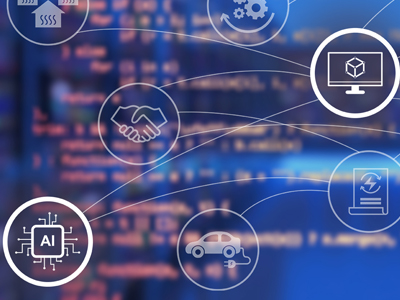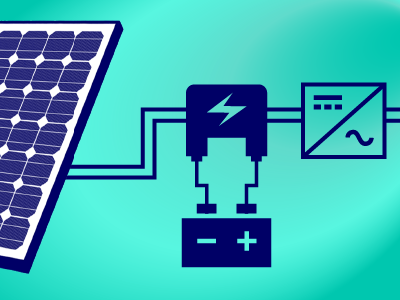Overview
Course video
Design an integrated energy system recognizing the role of intelligent use of various technologies including renewable energy sources, energy storage, electric vehicles, thermal systems and interconnected multi-carrier grids.
This course will teach you how to design an integrated energy system considering various existing and up-and-coming technologies, such as renewable energy sources, energy storage, electric vehicles, thermal systems and interconnected multi-carrier grids, including natural gas and hydrogen. A special emphasis is placed on exploiting the synergies between different technologies in intelligent ways, to help the transition of the energy sector from fossil fuels to sustainable sources of energy. Intelligent operation and control are considered in this course as an essential part of the design. Learners apply the knowledge in an open-ended design project to see how they can use their newly gained skills to create a sustainable future for their city/neighborhood/ building.
This course has been developed by experts from TU Delft with decades of research experience and covers the key energy technologies and their synergies. The academic concepts are complemented with industry perspectives presented by guest experts from energy-related companies.
This course is aimed at professionals in the energy industry who want to broaden their perspective and discover the opportunities and benefits that accrue from synergies between different energy technologies and digital intelligence in an integrated energy system. Likely to benefit most are people in roles such as energy system designer, engineering project manager, power system planner, heating grid planner, system integration engineer, electric mobility infrastructure planner, etc. The key sectors to use this knowledge are grid operators, energy producers, energy suppliers, mobility system providers and operators, thermal system providers, energy technology startups and energy consultancy.
What You'll Learn:
- Analyze the synergies between different energy technologies, energy carriers and energy sectors according to their technical characteristics
- Evaluate the flexibility, grid support and reduction in carbon footprint that can be obtained by transition to electric mobility and electrified heating
- Assess the potential of intelligent use of energy technologies in an integrated fashion harnessing the potential of energy storage in a sustainable energy system
- Model multi-carrier energy system using an appropriate model resolution
- Design an integrated energy system considering renewable energy resources, energy storage, electric mobility, electricity, gas and thermal grids
Quote from Learners
"During my internship, I worked on grid code analysis of different countries. I wanted to learn more on integrated renewable resources and multi energy system. In this course I learned about emerging technologies for integrating renewable resources and and coping with intermittency and variability issue of grid infrastructure. I would recommend this course for anyone working in energy sector as it teaches about many emerging technologies, which can be implemented for stable and secure power network." - Sunil Das, Engineer from India
Details
Course Syllabus
Module 1: Grid Integration of Renewables
You will learn how to integrate renewable energy sources into the electricity grid. Specifically:
- Grid challenges and control for renewable integration into the grid
- Power electronics for the integration of renewables
- Ancillary services using renewables
- Role of microgrids and multi-terminal HVDC
- Industry perspective on Grid Integration of Renewables
Module 2: Energy Storage in the Integrated Energy System
You will learn how to integrate intelligently and control energy storage and use demand side management. Specifically: :
- Importance of short- and long-term storage
- Existing and future technologies for energy storage
- Use of demand flexibility
- Coordination of multiple storage resources
- Power2X2Power (through hydrogen, ammonia, methane)
- Industry perspective on Integrated Energy Storage
Module 3: Smart Charging and Integration of Electric
You will learn how to use intelligence and integration in the transition to electric mobility and the crucial role of smart charging and vehicle-to-grid. Specifically:
- Challenges and opportunities for integrating electric vehicles into the electricity grids
- Smart charging of EVs, vehicle-to-grid (V2G) support and ancillary services
- Well-to-wheel emission of electric vehicles
- Solar charging of electric vehicles
- Industry perspective on Smart Charging of EV
Module 4: Integration of Thermal Energy Systems
You will learn about intelligent control and integration of thermal energy in the energy system. Specifically:
- Trends and opportunities in sustainable heating
- Thermal demand and thermal energy sources
- Intelligent control of heat pumps
- Thermal energy storage
- Heating and cooling grids
- Industry perspective on Sustainable District Heating Networks
Module 5: Multi-carrier Energy Grid Integration
You will learn how to integrate different energy systems into one multi-carrier energy system. Specifically:
- Intelligent planning and operation of multi-energy systems
- Energy conversion technologies for multi-carrier systems
- Modeling of multi-energy systems and model resolution
- Using power-to-gas conversion for system support
- Industry perspective on Integrated Energy System Planning
Module 6: Project on Designing an Integrated Energy System
In this module, learners apply the knowledge they’ve gained on technology integration and its intelligent use to design their own energy systems for the future
Other instructors
- Digvijay Gusain
- Simon Tindemans
- Jose Rueda Torres
- Zian Qin
- Laura Ramirez
- Aleksandra Lekic
- Phil Vardon
- Martin Bloemendal
- Carlos Infante Ferreira
- Eric van den Ham
Guest speakers
- Mart van der Meijden (TenneT)
- Senja Boom (Stedin)
- Joel Bosrup (Wintersol)
- Arjan Wargers (ELAAD)
- Marc Pijnenborg (EQUANS/ENGIE)
- Arjan van Voorden (Stedin)
Admission
This is a Massive Open Online Course (MOOC) that runs on EdX.
Prerequisites
Basic knowledge of working principles of one or more energy technologies against which to apply the concepts of integration and intelligence. Resources are available to fill knowledge gaps.


